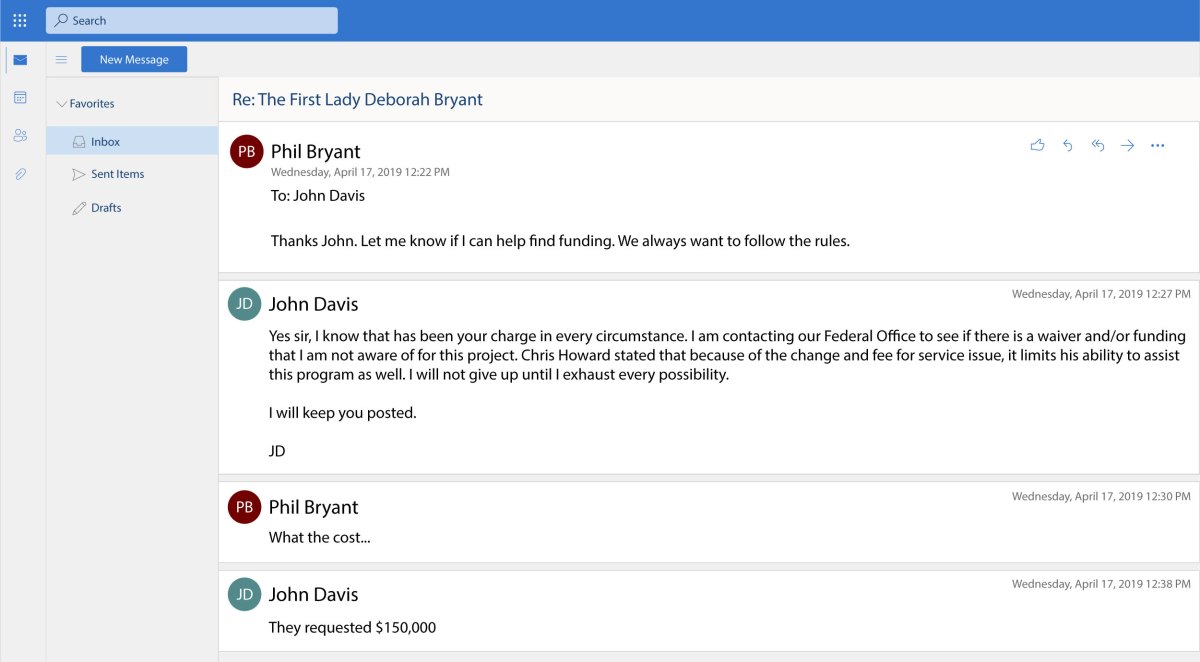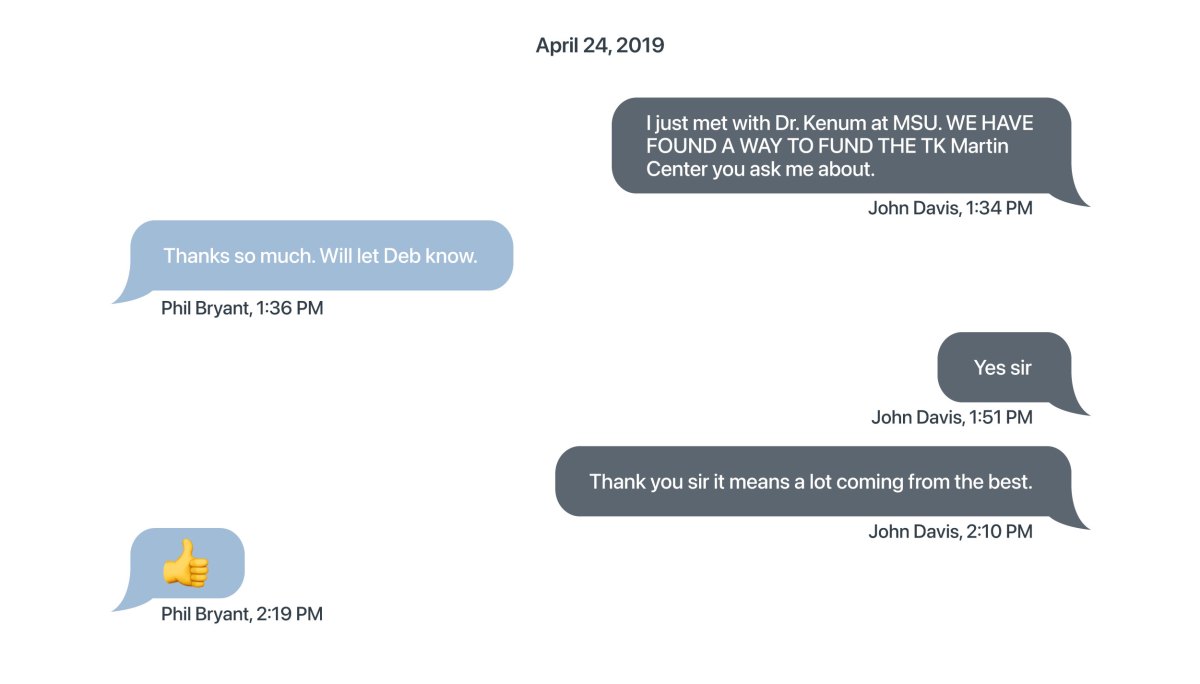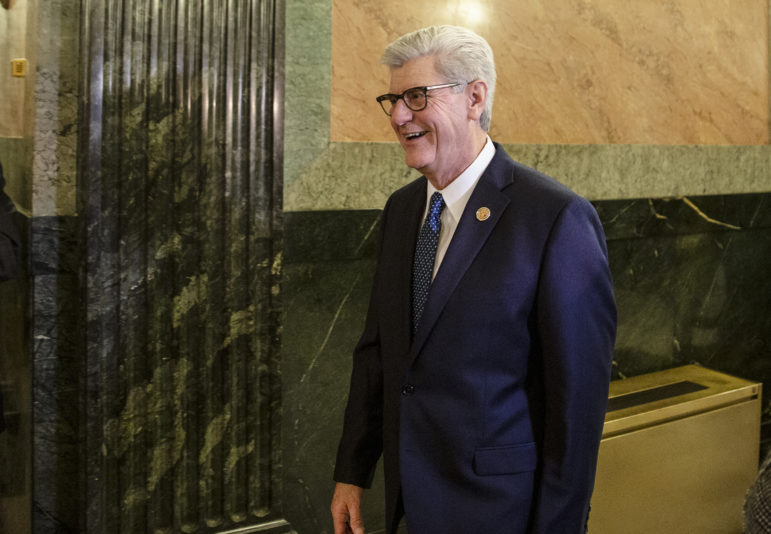Mississippi News
Governing by text: Phil Bryant’s hidden hand picked welfare winners
Governing by text: Phil Bryant’s hidden hand picked welfare winners
The tidal wave of alleged misspending identified by auditors at the Mississippi Department of Human Services was not confined to the headline-grabbing payments for publicity events with famous athletes, inspirational talks from a former pro-wrestler and construction of a new volleyball stadium.
Auditors say some disputed payments also included grants to established programs, such as the T.K. Martin Center at Mississippi State University that helps children with dyslexia learn to read.
The problem is not with the worthiness of the recipients but with how officials awarded the grants in violation of federal regulations, the auditors say.
The examples also show how then-MDHS director John Davis cut corners and skirted guidelines to further his own agenda and to try to satisfy the aims of former Gov. Phil Bryant. Behind his support for valid programs, Bryant’s requests also served to placate a campaign donor and the agriculture school, one of the state’s most powerful lobbies.
New communication obtained by Mississippi Today shows Bryant asking Davis about funding for specific vendors — encouraging Davis to pre-select grant awards — and the director eagerly complying.
“Yes sir we can definitely help,” Davis replied to his boss in one instance. “You can go ahead and tell them I will be reaching out to fund them. I will do today.”
The exchanges shed light on a larger scandal that began after Davis exploited his agency’s nonexistent bid process for federal block grants that came with virtually no federal oversight. Under his leadership, the agency started making upfront, multimillion-dollar payments to two private nonprofits, Mississippi Community Education Center and Family Resource Center of North Mississippi, to run an umbrella program they called Families First for Mississippi.
Davis maintained control over how Families First operated while he treated the private nonprofits and the public agency as one in the same.
But they weren’t the same because the nonprofit spending was shielded from public view, creating a black hole and concealing a raft of legal and ethical issues until state auditors finally caught up with them.
Davis and five others have pleaded not guilty to criminal charges while the state attempts to claw back payments identified as improper. Officials have not accused Bryant of any wrongdoing in the case.
Mississippi Today reviewed communication between Davis, Bryant and other welfare officials in the months leading up to the start of the state auditor’s welfare investigation to understand the closed-door decisions behind the public spending. Some of those text messages are reprinted here exactly as they appear without correction.
In this story, we examine two examples of Bryant asking Davis, his appointee, if he could fund a specific organization without using normal channels.
“Any way we can help?” Bryant worded his request both times.
In one case, Davis responded within minutes, assuring the governor he would reach out that day to fund Willowood Developmental Center, a nonprofit that serves adults and children with intellectual and developmental disabilities in Jackson.
Willowood was already under a separate child care grant with the department when Bryant sent Davis the request for Families First funding. And even though Willowood never ended up receiving additional MDHS funding after the exchange, Davis’ response reveals his agency’s cavalier and preferential grant award process – and Bryant’s involvement in it.
“If it’s wrong to try to help Willowood and those poor children out there, then I will have to say I was wrong, but I don’t think I was,” Bryant told Mississippi Today.
In the other case, Davis initially told the governor it would be against federal regulations for his agency to fund the T.K. Martin Center for Technology and Disability at Mississippi State University. But, then Davis found a way to award the center a grant anyway.
“Perhaps he did,” Bryant said. “And I hope it was proper and legal and ethical and moral because I remember people at Mississippi State, and I don’t remember who, calling and saying, ‘This is a wonderful program for these poor children and we’re going to lose it.'”
Both programs were associated with Families First for Mississippi, the now-defunct program that attached its name to many existing organizations across the state and promised to pump resources directly into the communities of needy residents.
In reality, the initiative was little more than a smokescreen for the widespread misspending of a federal grant called Temporary Assistance for Needy Families (TANF), intended to help the state’s most vulnerable residents. According to a Mississippi Today analysis of audit reports, independent accountants found that between 70% and 86% of purchases by the two Families First nonprofits violated federal rules – including welfare regulations, which are already some of the laxest guidelines of all federal grants.
For more than two decades, Families First was a catch-all phrase for services Mississippi provided with its TANF dollars.
Dating to the 1990s, after Congress overhauled the welfare system, small organizations across the state received “Families First grants” from the Mississippi Department of Human Services to offer parenting and anger management classes, after-school programs, tutoring, and job-preparation activities. Sometimes these entities received grants directly from the state agency and sometimes they received subcontracts from other MDHS subgrantees, making them what auditors call “third tier recipients.” The contractors were supposed to advance the state’s goal of helping low-income families “achieve self-sufficiency.”
But the state also used its welfare money and the Families First program to supplement the budgets of existing programs and private organizations that don’t seem to directly relate to poverty, such as services for children with disabilities – programs often absent from Mississippi’s notoriously underfunded public school system.
The state has broad flexibility to spend welfare dollars not just to help people out of poverty, but to prevent others from falling into it. Ideally, the money would be distributed as part of a cohesive plan for battling poverty in the state or through a competitive process to boost the most promising programs. But records show that under Davis, the agency often awarded grants at his discretion, sometimes on the suggestion of political leaders.
Davis said when he became director, Bryant instructed him to significantly consolidate the number of TANF grants to a manageable number, resulting in the large contracts with the two nonprofits. This was just one of multiple areas of the agency that Davis said Bryant instructed him to outsource, including child support enforcement.
The T.K. Martin Center, formed in 1997 and named after a former MSU dean and vice president, received a “Families First grant” in 2017 to open a program to help kids learn to read. It was called the IGNITE Dyslexia Clinic.
Willowood, a roughly $6 million-a-year, nearly 50-year-old charity funded primarily by government grants and run by a board of prominent community members, had received Families First funding throughout the 2000s, its director told Mississippi Today.
Both Willowood and T.K. Martin programs overlapped with another federal grant that investigators and auditors have yet to examine as closely as they have TANF: the Child Care Development Fund (CCDF).
From 2015 to 2019, MDHS had stopped giving Families First grants to Willowood but instead funded the center through a CCDF subgrant, which the nonprofit used to operate its day care center.
When the TANF program was in strife during the months leading up to Davis’ forced retirement – after his agency had cut the budgets of several subgrantees and Families First was bleeding funds – the agency also pivoted to CCDF to help T.K. Martin.
The Child Care Development Fund is a federal block grant, similar to TANF, that states can use to provide child care vouchers to low-income working parents or improve the quality of day care centers. In 2018, child care advocates complained that the agency had not approved a new voucher in five years.
A week after Davis told Bryant his agency couldn’t legally fund T.K. Martin, the welfare director visited Mississippi State University to tour the facilities and discuss funding with college president Mark Keenum, emails show. They struck a deal that day, according to text messages.
Nancy New, the nonprofit founder who partly ran Families First, also crossed paths with both programs. She is one of the central figures in the welfare scandal who has pleaded not guilty to several criminal charges and is awaiting trial.
New joined welfare officials when they visited T.K. Martin in April of 2019, according to an emailed itinerary.

New also attended a luncheon at Willowood with “special Guest Brett Favre,” a calendar entry from October 2018 shows. Willowood’s director told Mississippi Today that Favre’s cousin sat on its board and arranged for the former NFL star to speak at Willowood’s event and fundraiser.
Favre became a high profile figure in the welfare scandal after the auditor revealed that the New’s nonprofit had paid the athlete $1 million in welfare funds to promote Families First and to speak at events that the auditor said he didn’t attend.
“That was not one of the speeches he was quote-unquote supposed to make,” said Willowood’s executive director Curtis Alford, who added that Willowood did not pay Favre for the appearance.
A couple months after the event, Davis signed a $182,275 CCDF subgrant with Willowood “to promote self-sufficiency by promoting the optimal development of children” — language that more closely aligns with the purposes of TANF. A week later, calendar entries show, the News planned to attend a tour of Willowood.
Independent accountants found that Family Resource Center of North Mississippi, one of the Families First subgrantees, had illegally funded the dyslexia program at T.K. Martin Center in 2017 and 2018.
Overall, auditors determined that the nonprofit misused more than $11.5 million in federal grant dollars, including $717,000 it improperly paid to Mississippi State University. That included the grant that went to T.K. Martin. No one from the north Mississippi nonprofit has faced criminal charges.
In the spring of 2019, while the Family Resource Center faced reported budget cuts and its grant to T.K. Martin had expired, Davis received a flurry of messages.
He heard concerns about the reading program from First Lady Deborah Bryant, U.S. Sen. Cindy Hyde-Smith and the head of the Republican Party in Starkville where Mississippi State University is located, texts show.
“Things like this disturb me,” Deborah Bryant said in an email to her husband, referring to the story of a mom whose 6-year-old daughter was at risk of losing the life-changing services she received from the clinic.
Bryant, who struggled with dyslexia as a kid, forwarded his wife’s email to Davis. “Anyway we can help?” he wrote from his personal email account.
Davis said he couldn’t. He told the governor that his agency would be violating federal regulations if it funded the center – even though MDHS had already indirectly funded the center through Families First.
“My attorneys told me that after they reviewed the scope it is all clinical based diagnosis and treatment,” Davis told Bryant in the April 17, 2019 email. “They advised me that they are of the opinion that it cannot be funded with TANF or any other MDHS funds.”
A footnote in the forensic audit referenced this email, but didn’t mention that the recipient was Gov. Bryant. Auditors determined that TANF money could not be used for the services at T.K. Martin because the program did not target needy families. The audit never acknowledges that the center eventually received child care funding.
“Thanks John,” Gov. Bryant responded. “Let me know if I can help find funding. We always want to follow the rules.”

The same day as the email, the Columbus Dispatch published a story addressing concerns that MSU might be closing T.K. Martin, which included vague quotes from university officials saying that a new plan for funding “is still being formulated.”
Behind closed doors, the university was discussing funding with Davis. A week later, welfare officials visited the campus to discuss the program.
With the help of a deputy director named Jacob Black, who also attended the April 24 tour, Davis found the funding workaround. The day of the visit, Davis texted Bryant, saying he had “FOUND A WAY TO FUND THE T.K. Martin Center you ask me about.”

Later that day, Black texted Davis, recommending they add T.K. Martin into its application for renewed federal preschool funding, which was set to open in a few months. The federal agency eventually rejected Mississippi’s application and the state never got that funding.
“I think we can bridge the gap until that funding starts next spring. I will make that happen,” Black wrote.
Davis thanked Black for “always thinking ahead.”
“I am just tying to keep up with my teacher,” Black responded. “Thank you for being that teacher.”
Davis relied on Black, who is an attorney, to provide legal advice and ensure the agency was complying with the law. Their communication suggests Black knew how to get creative with funding. Once, when Davis asked Black by text if he could find $2.5 million to shore up New’s nonprofit, he agreed to find a way.
“Let me figure out how to do it without creating an audit finding,” Black wrote.
Davis and Black seemed to get along; the director once told his deputy that the governor “thinks a great deal of you.”
But Black apparently wasn’t as loyal to Davis as he appeared. Black was one of the employees who took information about Davis’ alleged misspending to Phil Bryant’s office in late June of 2019, according to a former agency spokesperson. Bryant alerted State Auditor Shad White, according to the auditor, prompting the investigation that identified rampant misspending and possible theft. Officials have not made public what exactly the tip entailed, calling it an exempt investigatory record. After Davis was ousted, Black remained a top agency official and even became interim director for about a month in early 2020 before current Gov. Tate Reeves replaced him with former prosecutor Bob Anderson. Soon after, Black left MDHS to take a staff attorney job at Medicaid.
Days after the MSU tour, Davis told Gov. Bryant the funding to T.K. Martin was a done deal, even though the agency didn’t yet possess a “scope of work” document from the center and wouldn’t officially ink the grant for almost three months.
“They are being funded,” Davis texted Bryant on April 26. “…They sent a memo out telling the staff at TK Martin everything is good … I told him that’s all I needed to know. So, we are slick.”
Officials never publicized – even in a press release about T.K. Martin published weeks later – that the welfare agency provided the stopgap.
Mississippi State spokesperson Sid Salter did not return several phone calls for this story, but he told Mississippi Today by email, “Your assertions regarding ‘closed doors’ or ‘workarounds’ reflect neither the spirit nor the letter of what transpired at the meeting” with Davis.
That July, days after the investigation into Davis began, Black signed the official MDHS subgrant agreement with T.K. Martin for $149,978. Since MDHS awarded the grant after Davis left office and the money came out of the child care fund and not TANF, the main grant under investigation recently, forensic auditors have not examined this expenditure.
In the subgrant file, there is a non-solicitation grant sheet, on which officials must explain why they are awarding funds outside of a bid process. On the document, there is a box that asks agency officers to “explain in detail the reason(s) that quotes, bids or proposals were not requested to obtain an award of services.”
The box is empty.
“Any assertion that MSU did not appropriately apply for the MDHS grant is simply not factual,” Salter wrote.
Although T.K. Martin is no longer receiving funding from MDHS, the university representative said the program is on solid footing. “MSU is proud of the T.K. Martin Center and openly advocates for funding to keep TKMC programs operating because those programs serve deserving clients,” Salter said by email.
Last year, Gov. Reeves awarded T.K. Martin $242,000 from his Governor’s Emergency Education Response (GEER) pandemic relief funds for IGNITE, its dyslexia and reading clinic. A relatively new program, IGNITE was propped up in 2017 by the allegedly illegal Families First grant from Family Resource Center. The clinic curiously shares the same name, Ignite, with other welfare-funded programs run by Christian ministers and former WWE wrestlers within Gov. Bryant’s welfare-funded “faith-based initiative.”

Bryant made a similar intervention on behalf of Willowood, the Jackson center that provides services to adults and children with special needs and runs a day care center that often takes kids who are in state custody.
From 2000 to 2010, MDHS had given Willowood an annual Families First grant averaging around $130,000, which allowed it to run fatherhood initiatives or programs at Mississippi’s youth detention center. But in recent years, Willowood hadn’t received that funding, so it stopped providing those services.
Alford, the Willowood director, told Mississippi Today that around 2018, he began discussing the changing landscape of the state’s welfare program with other community leaders, asking, “How do you get back into the Families First deal?”
“They said, ‘Well, Nancy New is controlling a lot of that money now,’” Alford said. “I reached out to her to see if we could get back into that loop of money.”
But the help never came.
Willowood board member David Marsh wrote Bryant a letter in March of 2019, just a few months before the auditor’s investigation began and Davis abruptly retired.
“You have been a friend to Willowood for numerous years and we can’t thank you enough for your support,” wrote Marsh, owner of a local construction company. “We humbly ask that Families First reinstate the $150,000.00 that Willowood desperately needs.”
Marsh, whose company Benchmark Construction has donated $6,200 to Bryant’s political campaigns over the years, told Mississippi Today that he had known Gov. Bryant for decades. Marsh said Bryant helped Willowood fundraise when he was state auditor.
“I thought that would be beneficial if he knew that Willowood needed help,” Marsh said. “… So I just reached out to him because I know him personally and wanted to see if there was any opportunity to get that (Families First grant) back.”
Gov. Bryant sent a picture of the letter to his welfare director, Davis, with the message, “Anyway we can help these guys?”
Davis said yes. “You can go ahead and tell them I will be reaching out to fund them,” he responded. “I will do today.”
Though the Families First program collapsed before Willowood received another grant, the exchange shines light on Bryant’s role in the channeling of funds not just at the state agency level, but through the privatized Families First program run by Nancy New.
Auditors have accused Davis of having inappropriate involvement in New’s funding decisions, demonstrating his favoritism and undue influence over the nonprofit. But in the case of Willowood, Bryant appeared to wield the power.
After Marsh sent the letter, Alford said he received a call.
“In just a couple days,” Alford said, “Nancy New called me and said, ‘I understand that the governor says that y’all are supposed to be getting money from us and we’re not giving it to you.’”
“She said she was going to try to fund me something and then she got arrested, I’m assuming, shortly after that because I’ve never heard another word from her,” he said.
This is Part 3 in Mississippi Today’s series “The Backchannel,” which examines former Gov. Phil Bryant’s role in the running of his welfare department during what officials have called the largest public embezzlement scheme in state history.
This article first appeared on Mississippi Today and is republished here under a Creative Commons license.
Mississippi News
Ole Miss women get pair of double-doubles and roll to 83-65 March Madness win over Ball State
SUMMARY: Mississippi coach Yolett McPhee-McCuin found solace in returning to a different arena in Waco, Texas, following a disappointing previous tournament experience. The No. 5 seed Ole Miss Rebels redeemed themselves with an 83-65 victory over 12th-seeded Ball State in the NCAA Tournament’s first round. Starr Jacobs led the Rebels with 18 points and 11 rebounds, while Kennedy Todd-Williams and Madison Scott each scored 15 points. Ole Miss dominated rebounding, leading 52-32, and will face fourth-seeded Baylor next. Coach McPhee-McCuin noted the team’s evolution since their last visit and the significance of playing in Texas, where Jacobs feels at home.
The post Ole Miss women get pair of double-doubles and roll to 83-65 March Madness win over Ball State appeared first on www.wjtv.com
Mississippi News
Events happening this weekend in Mississippi: March 21-23
SUMMARY: This weekend (March 21-23), Mississippi offers a range of exciting events. Highlights include Hal’s Marching MALfunction Second Line Stomp and Jessie Robinson’s blues performance in Jackson, as well as the Natchez Food & Wine Festival and the Natchez Little Theatre’s production of *This Side of Crazy*. There are also numerous exhibitions like *Of Salt and Spirit: Black Quilters in the American South* in Jackson and *Gold in the Hills* in Vicksburg. Other events include the 48th Annual Crawfish Classic Tennis Tournament in Hattiesburg, karaoke nights in Laurel, and a variety of family-friendly activities across the state.
The post Events happening this weekend in Mississippi: March 21-23 appeared first on www.wjtv.com
Mississippi News
Events happening this weekend in Mississippi: March 14-16
SUMMARY: This weekend (March 14-16) in Mississippi offers a variety of events. In Jackson, iconic saxophonist Boney James performs at the convention center, while the JXN Food & Wine festival showcases culinary talents. The LeFleur Museum District hosts a “Week of Wonder,” and several exhibitions, including “Of Salt and Spirit,” celebrate Black quilters. Natchez features the Spring Pilgrimage tours, a reenactment of Annie Stewart’s story, and a St. Patrick’s Day celebration. In Hattiesburg, comedian Rob Schneider performs, and various events like a St. Patrick’s Day pub crawl and a talent show will take place throughout the area.
The post Events happening this weekend in Mississippi: March 14-16 appeared first on www.wjtv.com
-

 News from the South - Florida News Feed7 days ago
News from the South - Florida News Feed7 days agoFamily mourns death of 10-year-old Xavier Williams
-

 News from the South - Alabama News Feed5 days ago
News from the South - Alabama News Feed5 days agoSevere storms will impact Alabama this weekend. Damaging winds, hail, and a tornado threat are al…
-

 News from the South - Alabama News Feed5 days ago
News from the South - Alabama News Feed5 days agoUniversity of Alabama student detained by ICE moved to Louisiana
-

 News from the South - Louisiana News Feed6 days ago
News from the South - Louisiana News Feed6 days agoSeafood testers find Shreveport restaurants deceiving customers with foreign shrimp
-

 News from the South - Oklahoma News Feed3 days ago
News from the South - Oklahoma News Feed3 days agoTornado watch, severe thunderstorm warnings issued for Oklahoma
-

 News from the South - Oklahoma News Feed7 days ago
News from the South - Oklahoma News Feed7 days agoWhy are Oklahomans smelling smoke Wednesday morning?
-

 News from the South - West Virginia News Feed6 days ago
News from the South - West Virginia News Feed6 days agoRoane County Schools installing security film on windows to protect students
-

 News from the South - West Virginia News Feed7 days ago
News from the South - West Virginia News Feed7 days agoStudents in Monroe County Schools are ready to shoot their way to the WV State Archery Championships














































